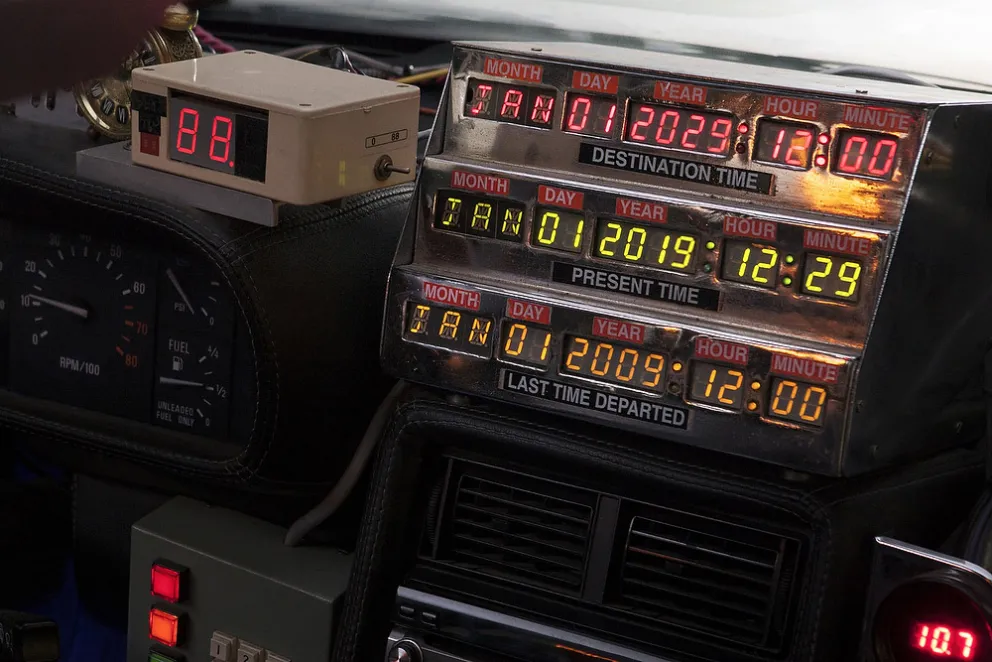
A lot can happen in a decade. Ten years ago, Vincent Laforet and the Canon 5D Mark II had just sparked the DSLR video revolution in earnest. The D3s had just been publicly announced as the newest Nikon flagship model. The DJI Phantom 1 drone was still 4 years away and Sports Illustrated was still a weekly magazine...
Ten years later many UPAA members have gone from still photography-only to multimedia jugglers. Every new DSLR does 4K this and 120P that...Drones are everywhere...
What changes are in store in the next ten years? The UPAA blog asked several members who are at different stages of their careers and professional development for some thoughts.
Respondents:
Early career: Less than 10 years in a staff job
-Jessica Bartlett, California State University, Chico
-Derek Eckenroth, Bob Jones University
Mid-career: 10+ years
-Jon Hendricks, Valparaiso University
-Lyndsie Schlink, Illinois State University
-Glenn Carpenter, Moraine Valley Community College
-Matt Cashore, University of Notre Dame
Retirees: 25+ years in a university staff position
-Robert Jordan, University of Mississippi
-Jim Dusen, SUNY Brockport

First question is the big one: Are there still university photographers in ten years?
•The 1988 UPAA Symposium slogan was was “Electronics In Our Future”. The first filmless camera was introduced to us, a Canon still video model. Of course we were amazed and somewhat concerned about what this would do to our profession. How would we cope with this new technology invading our world of film? Well, the UPAA now has a growing membership comprised of photographers who were yet to be born in 1988. And although some campuses have eliminated their photo staff to save a few bucks, there are position announcements appearing almost weekly on our Facebook page.
-Jim Dusen
•One argument was that cellphones would take our jobs. Well, I feel like if that were true, they would have already done so. I shoot a few weddings a year on the side, and most of those weddings I’m 1 of about 100 “cameras” capturing the day. And yet they still paid me to be there and not the other 99. There is more to our profession than just capturing an image. There is a reason we are called professionals.
-Derek Eckenroth
•The best way to recruit students and engage alumni and donors is through strong visuals in social media, advertising, and electronic and printed publications. This continuing need for timely professional imagery has kept University Photographers in demand when other photography jobs have not fared so well. Some universities are even adding staff photography positions.
-Robert Jordan
•I believe that there will continue to be a sufficient demand for high quality, creative photography produced by staff photographers at universities in 10 years. Having worked as the solo photographer for Illinois State for the past 12 years, we were finally able to add a second full-time photographer this September to meet the growing demand. In the past two years we’ve added two magazines in addition to over 1,200 other printed publications and our countless website and social media accounts.
-Lyndsie Schlink
•I see professional photographers changing their perspectives and being much more fine-tuned in ten years. They will have to understand their niche rather than being general event coverage photographers. Every Gen Z’er will be semi-proficient on collecting basic media and will be able to share it somewhat easily at any photographable event. But, just like DIY home improvement, it’s a matter of if the general public wants to invest their time and energy for the harder stuff. Professionals will still get paid a decent wage to get the niche job done well and on time.
-Jon Hendricks
•Yes, but the position will be different. Visual content will always be needed and professionally produced content is a must. A must because there are liability issues with imagery that have to be protected, usage rights, permission, and the all important issue of being on-brand.
-Glenn Carpenter
•Short answer: Yes. But I’m guessing in 2029 there will be few if any job postings for pure still photographers. Still photography will become just one of several tasks expected in a ‘multimedia generalist’-type role.
-Matt Cashore
•I hope that there will still be University Photographers in 10 years! My prediction would be a yes. I can’t imagine the need for visual storytelling to go away. I think that a university’s visual identity will still remain important, and photography will continue to be needed for marketing, storytelling, and communication purposes. If anything, I think that the need for photography will only rise in the coming years.
-Jessica Bartlett

Technological changes that excite you?
•I’m very excited to see software expand in the virtual world. Mixing photos/videos into VR will hopefully be easier in ten years. It will add another dimension of interactivity via mobile.
-Jon Hendricks
•Integration of Google facial identification into our DAM systems.
-Glenn Carpenter
•I remember being blown away at how much better the Nikon D4 was in every way compared to the D3 and I thought cameras couldn’t get any better. The D5 proved me wrong. Higher resolution cameras ushered in a whole new generation of extraordinarily sharp and fast lenses. Between the advances in cameras and editing software, if you can imagine it you can capture and create it. Now the Nikon D6 is on the way and I can’t imagine how it could get any better, but I’m sure it will be.
-Robert Jordan
•Drones. Better tech will keep pilots out of trouble both from the standpoint of collisions as well as airspace/legal violations. DJI now incorporates FAA facility map altitude restrictions automatically and my Mavic 2 knows if it’s in a 100’ zone, 200’ zone, etc. Better cameras will make cheap drone flights competitive with expensive helicopter charters.
-Matt Cashore
•Continued development of delivering photos wirelessly. And very closely tied with the ability to deliver wirelessly is the increasing ability to get images right in camera with mirrorless technology and improving in-camera profiles. Also, increases in cameras’ capabilities of capturing a larger dynamic range. It’s so cool to see that digital has finally surpassed film in dynamic range capabilities! HDR processing is almost obsolete at this point. So cool!
-Derek Eckenroth

Technological changes that scare you?
•I am most pessimistic about personal UAV’s (drones) because I already see a lot of people that are not safe with them and break FAA rules. I’m already navigating a flurry of low flying planes on our campus and I can’t imagine what it will be like in 10 years.
-Jon Hendricks
•Higher and higher resolution in video cameras. Will still photography needs be met with frame grabs from videos? Sports photography will be the ‘canary in the coal mine’ on that, I think.
-Matt Cashore
•Smartphone photography aka ‘citizen journalism’ put many newspaper photographers out of work. Anyone could buy a camera at Costco, charge the batteries and make a decent photo without even reading the instructions. How many of us have given camera buying advice to friends who turn ‘pro’ within a few months of getting their first DSLR? With more photojournalist and hobby photographers entering the freelance photography business, the market will become even more crowded and pricing will remain at the pre-digital rates or less.
-Robert Jordan
•I am fearful that with the increase in technology that society will become too dependent on its use. I am afraid that with this growing dependency, we will not know how to get by if this is taken away from us. I am also fearful of the negative consequences of this dependency on our physical and mental health. With the increase in virtual reality and online identities, I fear that we can lose track of our authentic sense of self behind our screens.
-Jessica Bartlett

How will 16-18 year-olds want to be communicated with in 10 years?
•Same as today, not by 35+ year-old marketing execs that think they are 20. We have no idea what will be “in.” My 21 year-old communicates via Venmo. Not because it is efficient but because it is fun and different.
-Glenn Carpenter
•In 10 years, 16-18 year olds will want to be communicated with in short, clear and to-the-point messaging. With the growing popularity in snapchat and instagram, I think that the younger generation will want instant and easy to digest content.
-Jessica Bartlett
•Convenience isn’t going away. So whatever is convenient in 10 years is how we and the younger generation will want to communicate. Who knows? Maybe even the wallpaper in our houses will be screens. How cool would it be to decorate my living room with the latest photos from my favorite photographers? As for portability, smart phones may just merge entirely into smart watches, and we wirelessly link whatever screen or listening device we want directly to our watch.
-Derek Eckenroth

What sort of professional development should a university photographer today be pursuing?
•I think that University Photographers should be involved in professional development that is related to both their photography growth as well as their growth as a university employee. I have found that as great as it is to work with any and all photographers, being able to connect with fellow University Photographers is extremely beneficial. As a University Photographer, I have benefited substantially from the short amount of time that I have been involved in the University Photographers Association of America. It is especially helpful being able to collaborate, acquire knowledge from, and form relationships with others who do exactly what I do. I know that if at any time I have a question or need feedback from fellow University Photographers, I have connections through the friendships I’ve made from the symposium, as well as a facebook group where I can connect with others instantly.
-Jessica Bartlett
•I recommend attending the UPAA Symposium every year. I would also recommend attending any of the Kelby one day conferences, as well as the Robert’s Camera workshops. I am personally pursing my master’s degree in Arts Technology from my University.
-Lyndsie Schlink
•Video. In more recent years many of today’s campuses employ photographers who really enjoy both video and photo. At Brockport the two successors to my position have shown excellence doing both and manage a different set of priorities than I experienced.
-Jim Dusen
•Video is here to stay. There will always be a place for photos, but the video and photo worlds are merging. So lessons on recording clean audio and how to stabilize your camera for video are going to be important moving forward.
-Derek Eckenroth

What do you wish you could have known/foreseen 10 years ago?
•I am a very fortunate person to have had my career when I did. It was stimulating and challenging and allowed my creativity to provide a three-decade visual story to Brockport’s long history. I left on my own terms at a good time for me and to have younger professionals take advantage of the new technology to help fulfill their careers.
-Jim Dusen
•10 years ago I was in high school and I would take photos on a small point and shoot camera as a hobbyist. What I wish I knew back then was how much technology would grow for photography. I didn’t foresee how much smartphone cameras would improve, and how “instant” the photo world would become. With the growth of social media, most photos are now viewed from a smartphone instead of print. I find it fascinating how fast the photo world has been evolving, and I am excited to see what’s to come.
-Jessica Bartlett
•I wish I would have known the importance of having a master’s degree in order to be paid a great salary. When I graduated from college in 2004 it was sufficient to have a bachelor's degree. Had I known I would’ve pursued it shortly after getting my bachelor’s degree and not waited 15 years to get it when it’s become a priority in order to move up in the corporate ladder.
-Lyndsie Schlink
•I’m not 10 years into my career as a professional yet. However, something that did catch me off guard slightly even being fairly new to my professional career was how important the internet was going to play into photography and how that affected the demand of photos.
-Derek Eckenroth
•I think if I could go back 10 years I’d invest in Facebook and get a 20x profit! And I also wish that I joined up with some mentors more often or even volunteered to work alongside people whose work I admired. You can find out a lot about yourself by comparing first-hand workflows and passions. Lastly, I would expand my personal brand more in order to sell my experience rather than just my photography.
-Jon Hendricks
•The winning Lotto numbers a day early!
-Glenn Carpenter
_________________________________________
“What happens if Doctor Who goes back in time and sees himself? A pair o' docs!”